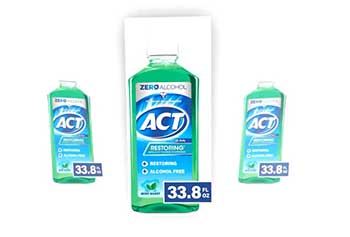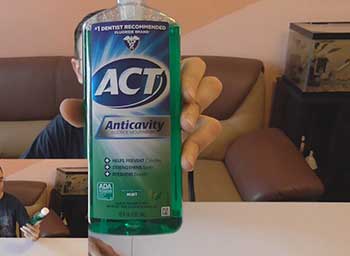


Oral health is an important part of overall wellbeing. Using an effective mouthwash can help prevent cavities, reduce plaque buildup, and freshen breath. Two popular options on the market are ACT Restoring and ACT Anticavity mouthwashes. But what exactly sets these oral rinses apart?
In this comprehensive guide, we’ll compare and contrast Act Restoring and Anticavity mouthwashes, analyzing the key ingredients, intended benefits, cost, taste and more. Read on to learn which one may be best for your oral care needs.
Act Restoring mouthwash aims to strengthen tooth enamel and help prevent cavities. It contains fluoride, which is known to aid in rebuilding weakened enamel and preventing tooth decay.

Some key features of Act Restoring mouthwash include:
Fluoride Formula – Contains 0.02% sodium fluoride, which helps strengthen enamel against acid attacks that can lead to cavities. Daily use provides a preventive dose of fluoride.
Enamel Protection – Formulated to protect and rebuild weakened tooth enamel. Helps prevent cavities and further enamel loss.
Minty Taste – Leaves a refreshing mint flavor in the mouth for long-lasting fresh breath.
Alcohol-Free – Does not contain alcohol, so it is safe for everyday use without drying out the mouth.
ADA Accepted – Has earned the ADA Seal of Acceptance for helping prevent cavities when used regularly.
Act Restoring mouthwash aims to both prevent new cavities from forming while also strengthening existing enamel against decay. The key active ingredient, fluoride, integrates into the tooth structure to make it more resistant to acid.
ACT Anticavity contains fluoride as well, but also includes an anticavity formula to help strengthen teeth. Key details include:

Fluoride Formula – Contains 0.02% sodium fluoride to strengthen enamel and help prevent cavities when used regularly.
Anticavity Ingredients – Includes an optimized fluoride formulation with an anticavity agent for extra protection against tooth decay.
Clean Mint Taste – Provides long-lasting fresh breath with a refreshing clean mint flavor.
Alcohol-Free – Does not contain alcohol so it is safe for daily use.
ADA Accepted – Earned the ADA Seal of Acceptance for cavity prevention with consistent use.
The anticavity agent works along with the fluoride to reinforce the tooth enamel against acid attacks from sugary and acidic foods and drinks. This added ingredient is designed to boost the mouthwash’s cavity-fighting ability.
The key active ingredients in Act Restoring and ACT Anticavity mouthwashes are quite similar:
Fluoride – Both contain 0.02% sodium fluoride as the main active ingredient to strengthen enamel and prevent cavities.
Anticavity Agent – ACT Anticavity contains an additional anticavity agent for extra protection. Act Restoring relies solely on fluoride.
Alcohol-Free – Neither mouthwash contains alcohol, making them safe for daily long-term use.
The main distinction is that ACT Anticavity formula includes an extra anticavity agent on top of the fluoride. This additive aims to reinforce the teeth even more against acid and decay.
As oral rinses with fluoride, Act Restoring and ACT Anticavity share the main goals of:
So while both aim to prevent cavities with fluoride, ACT touts extra shielding thanks to its added anticavity agent.
The ACT Anticavity costs a bit more, likely due to the additional anticavity ingredient in its formula. But both are affordably priced for daily oral care.
The Act Restoring flavor seems to be a classic mint, while ACT Anticavity is described as a clean mint taste. But reviews indicate both have enjoyable minty flavor for freshening breath.
Here’s an overview of customer feedback on these two popular mouthwashes:
Act Restoring
ACT Anticavity
Overall, reviews indicate these fluoride rinses do seem to strengthen enamel and promote whiter teeth, but people are mixed on the taste.
Both Act Restoring and ACT Anticavity aim to prevent cavities with fluoride. But ACT Anticavity does contain that extra anticavity agent for additional reinforcement against tooth decay.
Several studies have shown fluoride mouthwashes can reduce cavity risk in children and adults when used alongside brushing and flossing. The fluoride strengthens weakened areas on the teeth.
The ACT formula also underwent a clinical study that found consistent use resulted in significantly fewer new cavities compared to brushing alone.
While both options help prevent cavities thanks to the fluoride, the ACT Anticavity formula may provide slightly stronger protection due to its anticavity additive. But both are recommended by dentists for cavity prevention.
Fluoride has been shown to help relieve dentin hypersensitivity, which causes pain from hot, cold, or sweet foods. It works by entering the small tubules in the dentin and creating a protective layer.
Both Act Restoring and ACT Anticavity contain fluoride, so they may both help reduce sensitivity. ACT Anticavity does contain that extra anticavity agent, but there is no research showing if it provides additional relief for sensitive teeth compared to regular fluoride rinses.
Overall, both options may potentially help strengthen enamel and reduce sensitivity thanks to the fluoride. But Act Restoring seems sufficient if sensitivity relief is your main goal.

Also watch this video!
Hi! I am Melvin K. – the multifaceted maestro of the digital realm. From the worlds of cutting-edge technology and high-end fashion, I craft content that's as sleek as the gadgets I review.